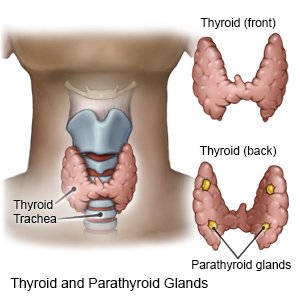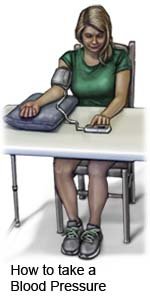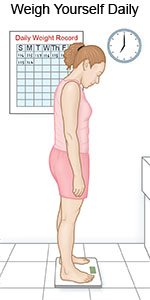Hyperthyroidism in Pregnancy
Medically reviewed by Drugs.com. Last updated on Aug 4, 2025.
Hyperthyroidism is a condition that develops when the thyroid gland makes too much thyroid hormone. Thyroid hormones help control body temperature, heart rate, growth, and weight.
 |
DISCHARGE INSTRUCTIONS:
Medicines:
- Antithyroid medicine decreases the amount of thyroid hormone made by your thyroid gland.
- Take your medicine as directed. Contact your healthcare provider if you think your medicine is not helping or if you have side effects. Tell your provider if you are allergic to any medicine. Keep a list of the medicines, vitamins, and herbs you take. Include the amounts, and when and why you take them. Bring the list or the pill bottles to follow-up visits. Carry your medicine list with you in case of an emergency.
Follow up with your doctor or endocrinologist as directed:
You may need to return for more blood tests to check your thyroid hormone level. This will show if you are getting the right amount of medicine. Do not stop taking medicines without talking to your healthcare provider first. Write down your questions so you remember to ask them during your visits.
Keep track of your baby's movements:
Keep track of how much your baby moves every day. This can be done in the morning, in the evening, or both. Wait 1 hour after you eat. Write down every movement that you feel from your baby. If you have trouble feeling movement, wait an extra 30 minutes. Ask for more information on how to keep track of your baby's movements. Contact your healthcare provider if your baby is moving less.
Related medications
Treatment options
The following list of medications are related to or used in the treatment of this condition.
Keep track of your blood pressure and weight:
- Healthcare providers will teach you how to check your blood pressure, and tell you how often to do this. It is important to measure your blood pressure in the same arm and in the same position every time. Keep track of your blood pressure readings, and the date and time you took them. Take this record with you to your prenatal visits.

- Weigh yourself daily before breakfast after you urinate. Write down your daily weight and take the record with you to your prenatal visits.

Nutrition:
Your body uses a lot of energy when it has too much thyroid hormone. You may need to eat more to give your body the extra energy it needs. Foods high in protein and calories will help prevent weight loss. Ask your healthcare provider which foods are right for you.
Call your doctor or endocrinologist if:
- Your baby is moving less.
- You have a fever.
- You feel nervous and restless.
- You have chills, a cough, or feel weak and achy.
- You run out of thyroid medicine or have stopped taking it.
- You have questions or concerns about your condition or care.
Return to the emergency department if:
- Your baby is restless and always kicking, or is not moving at all.
- You have sudden chest pain or trouble breathing.
- Your water broke, or you are bleeding from your vagina.
- Your heart is beating very fast.
- You faint or have a seizure.
© Copyright Merative 2025 Information is for End User's use only and may not be sold, redistributed or otherwise used for commercial purposes.
The above information is an educational aid only. It is not intended as medical advice for individual conditions or treatments. Talk to your doctor, nurse or pharmacist before following any medical regimen to see if it is safe and effective for you.
Learn more about Hyperthyroidism
Treatment options
Care guides
Symptoms and treatments
Medicine.com guides (external)
Further information
Always consult your healthcare provider to ensure the information displayed on this page applies to your personal circumstances.
